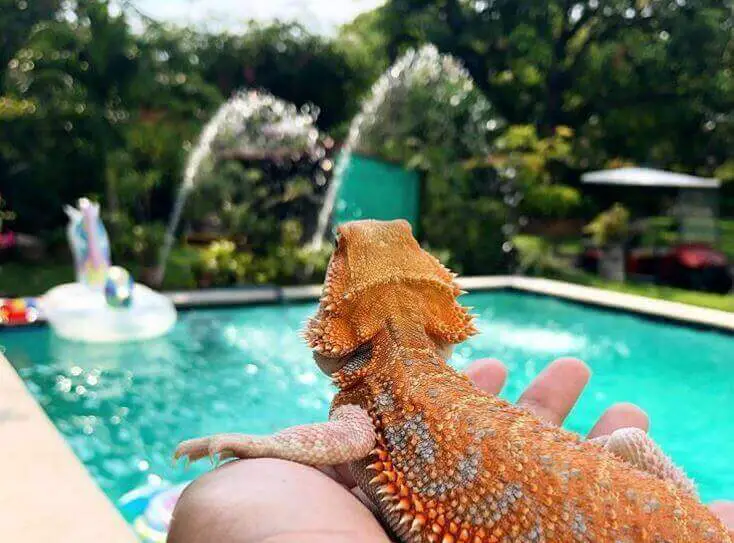Although these lizards are used to the very dry and hot environment in Australia and commonly dehydrated, they still need to get hydration. So a question that may come to your mind is “How Long Can a Bearded Dragon Go Without Water?”
There are also some cases you notice your beardie is not drinking, and don’t know how to deal with this situation.
A lot of problems may arise so it is better for you to have a profound understanding of your lizard and his drinking habits.
In this article, we would like to give you everything you need to know about bearded lizards and drinking habits.
Besides finding out “How Long Can A Bearded Dragon Go Without Water?”, you can also know why your dragon is not getting hydration as well as ways to be able to keep your pet happy and hydrated.
Therefore, let’s spend some minutes having a look at this article.
Related Posts:
- Why Is My Beardie Lethargic?
- Why Is My Beardie’s Beard Black?
- How Long Can a Beardie Go Without Heat?
- Why is My Beardie Hissing at Me?
- Why Is My Beardie Closing Eyes When Stroked?
- My Beardie Stare at Me?
How Long Can a Bearded Dragon Go Without Water?
As you know, beardies are naturally adapted to withstand dry desertic conditions in the Australian desert but this doesn’t mean that they can live without being hydrated.
In captivity, your pet should be given fresh water every day.
However, there might be unexpected circumstances that may prevent you from keeping your lizard hydrated or your dragon just refuses to take any.
So, how long can a beardie go without water?
Actually, they can still survive without it from 3 days to 2 weeks in case of their lack of hydration.
However, this shouldn’t be stretched or your beardie will experience serious health issues, and you had better check other considerations immediately.
How Much Water Does a Bearded Dragon Need Daily?
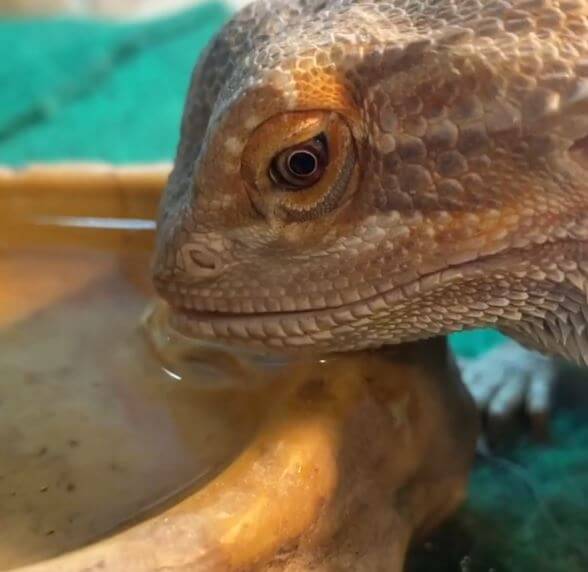
After finding out “how long can a beardie go without water?” and having a profound understanding of the importance of keeping your beardie hydrated every day, you may wonder how much is enough for your pet on the daily basis.
In general, the amount of lizard needs in a day depends on the age of the beardie.
In other words, a dragon needs 1% water of his body weight.
For instance, a 300-gram lizard is more likely to require 3ml daily.
If you are not sure about this, it is better for you to take advice from your reptile veterinarian.
How Does a Bearded Dragon Drink?
One thing about beardies that can surprise you is that they will not get hydrated as other pets or even humans do.
Without this knowledge, you are more likely to make incorrect assumptions or give your pet poor care.
Sometimes, you notice that some beardies don’t take H2O from the bowl just because they might not realize that the bowl provided is for drinking.
However, beardies can get hydrated in various ways so let’s check.
1. Drinking From Water Bowl
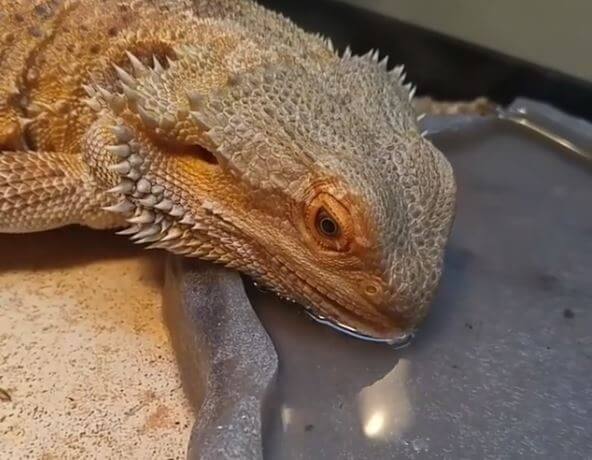
The first method that may come to your mind is drinking. In specific, they will get hydrated from the bowl directly by putting their mouths in it and licking.
This dramatically helps to keep the beardies hydrated.
Even if your beardie doesn’t appreciate it or drink it, you should provide him with a shallow water dish and make sure to clean it daily in the enclosure.
This is because your pet may often defecate in it, making it dirty.
2. Bathing
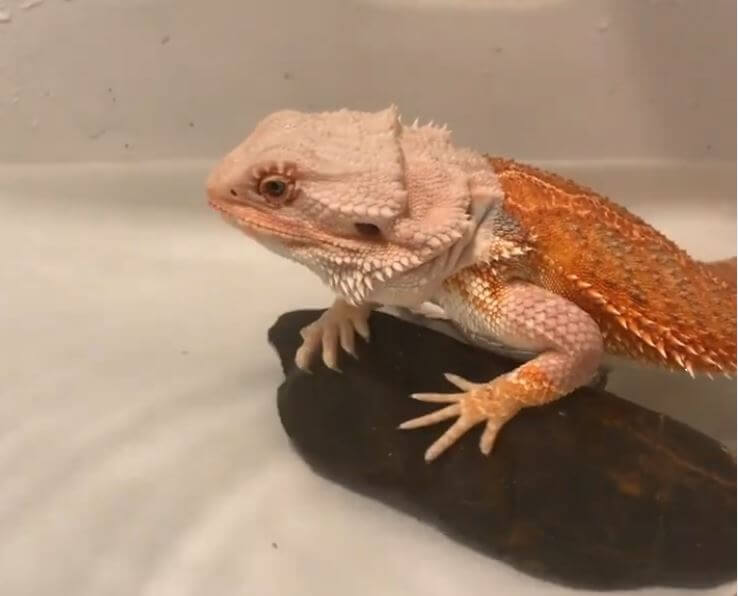
Another common way that a beardie often uses to get his hydration is bathing, which allows the dragon to absorb the H2O through the skin.
In the wild, beardies bathe by digging into the sand or finding wet earth, rubbing their bodies into it to absorb H2O.
In captivity, sometimes you notice your pet soaking in the water bowl you provided, which is bathing.
Also, you should give your pet a bath at least once a week. This helps decrease the risk of infection, increase bonding, and provide a good source for hydrating your pet.
When bathing him, it would be crazy to use chemicals as they are just harmful to your beardie.
3. Eating
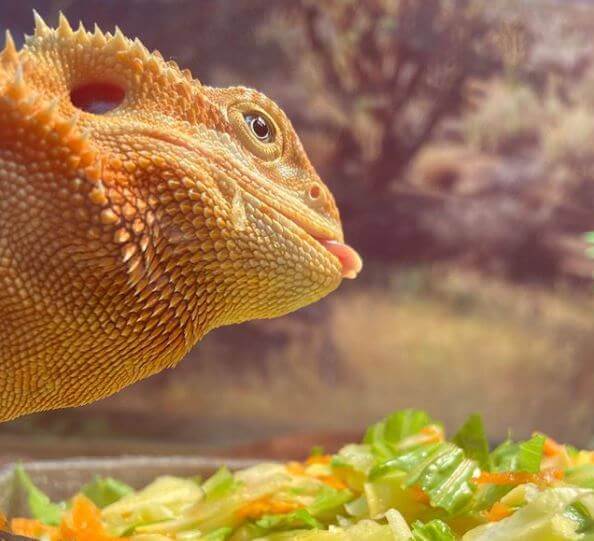
Your lizard can also get hydration through his food such as fresh vegetables and fruits, live insects, and maybe greens as all living things. Both plants and animals have an amount of water stored inside them and partly meet the beardie’s daily hydration requirement.
Fresh veggies and fruits are known to contain a pretty high degree of water than live insects and greens. While bearded live insect feeders like phoenix worms have a high amount, and they significantly help in hydration.
Therefore, well balanced and fresh food are highly recommended when your lizard is dehydrated or sick.
However, you shouldn’t rely too much on food as it will be not enough for the beardies.
Besides, you should make sure there is a bowl full of clean water in the cage every day.
Related Posts:
- Can Beardies Eat Rosemary?
- Can Beardies Eat Honeydew Melon?
- Do Beardies Eat Peas?
- Can Beardies Eat Squash?
- Can Beardies Eat Dill?
4. Misting
One way you can choose to get your beardie hydrated is misting him, the food, or the tank, and most beardies seem to enjoy it.
You just need to spray water onto your dragon and allow him to lap up the spray that way
Misting also helps your pet with shedding, making the skin supple and appear healthy.
However, you can mist your lizard everyday only when he is out of the tank, and be careful not to spray so much or the tank will get too wet.
Some owners purchase drippers that drip water into your beardie’s bowl or onto a plant, which allows the beardie to get hydrated as it needs.
Why Is My Bearded Dragon Not Drinking?
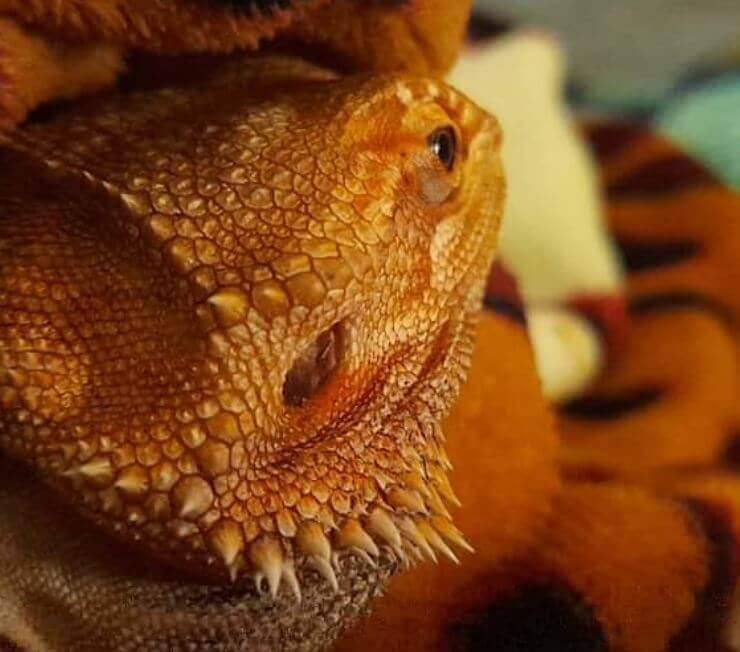
In case your beardie is not taking water, you shouldn’t be too worried as there are several reasons why a dragon may not be drinking.
Therefore, you first need to check if there is anything you have done wrong.
In this section, we’ll discuss these reasons and how they affect your beardy’s health.
1. Brumation
The majority of the beardies brumate to avoid cold temperatures during winter and conserve energy.
During brumation, they will sleep and refuse to drink or eat much like they will do during the typical days.
However, you should make sure that there is a water bowl in the tank as your pet may occasionally move to drink it.
You also need to watch for signs of dehydration.
2. Satisfied
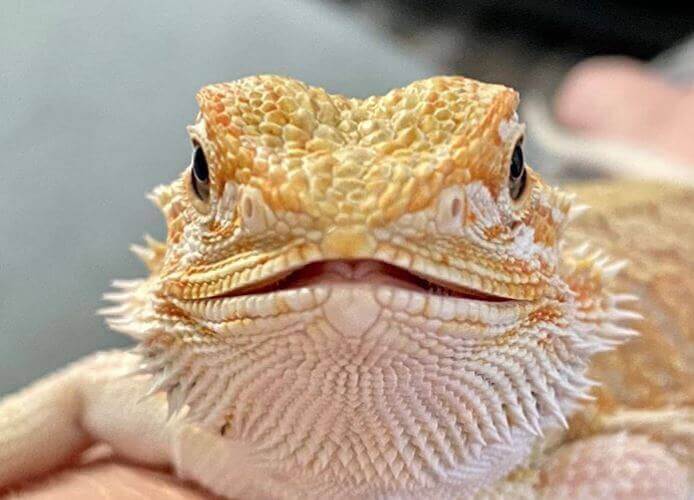
As beardies don’t need a lot to survive, and they can get enough hydration through other means.
Therefore, if you see your pet not drinking any from the bowl, don’t panic as he is already satisfied.
As long as your beardie is looking healthy and doesn’t show any signs of dehydration, there’s nothing to worry about.
Just remember to keep the water dish filled and give him baths at least once per week.
3. Stressed
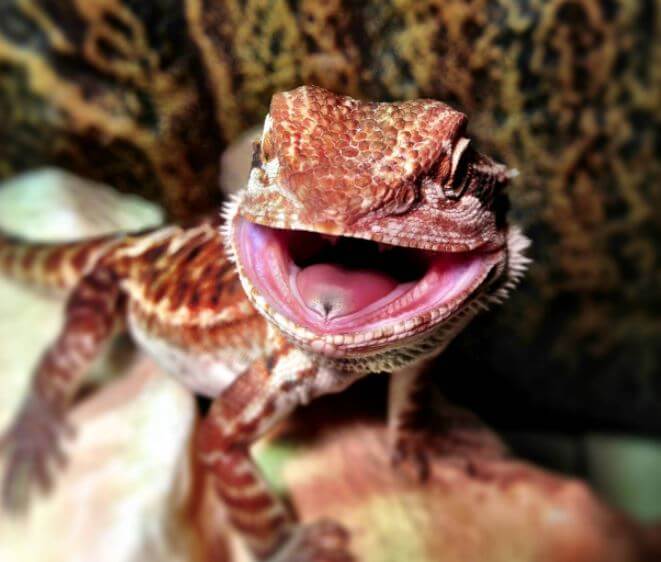
Another reason for your pet not getting hydration is that he is stressed or threatened.
There are several culprits that cause your beardie stressed, namely drastic changes in sound, light, and environment or the presence of other creatures.
As a stressed dragon doesn’t eat or drink, which makes him dehydrated more quickly and this is always something to make you worry.
Therefore, make sure all of these habitat factors are consistent if possible, and keep your dragon alone in the tank.
He will start drinking and eating within the next few days.
4. Sickness
If your lizard shows signs such as lack of movement, low appetite, visible injuries, or anything you feel is abnormal, definitely he is sick, which may explain why he is not drinking water.
In this case, you should take a trip to your reptile veterinarian as a beardie can be dehydrated due to illness.
5. Stagnant Water
In case, due to some reasons you forget to clean the water bowl or provide a fresh one in the enclosure, you may realize that the beardie drinks less.
Like other reptiles, beardies don’t want to drink stagnant water, which is contaminated.
Therefore, you should attach great importance to providing your pet with clean water every day.
How Do You Know If a Bearded Dragon Is Dehydrated?
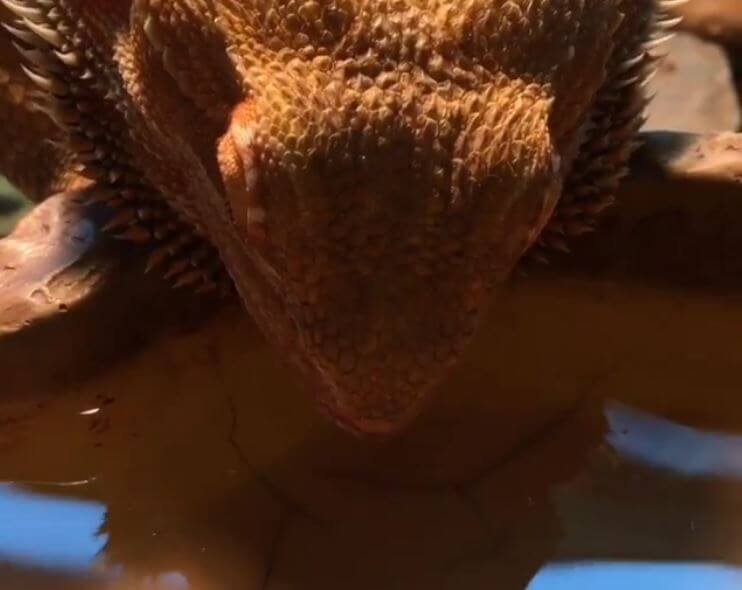
The fact that dehydration in your beardie not only means that your dragon simply needs hydration but also may be an underlying symptom of health issues.
If you suspect your beloved pet is dehydrated, there are some common symptoms of dehydration that can help you.
In this case, you also had better pay close attention to how much food, drinking, and bathing your pet is doing.
However, we highly recommend you take your pet to the vet if you notice these symptoms.
Also, you shouldn’t force your beardie to eat but simply give him some H2O very slowly if you don’t want your lizard to face some serious problems.
1. Skin Becomes Wrinkled
One of the common ways to check whether dehydration of your beardie is to notice his skin.
A hydrated dragon, especially a younger one typically does have wrinkly skin.
You can check it by lightly pinching his skin and release.
If the skin hasn’t returned to its original position almost immediately, chances are that your pet may be dehydrated.
2. Eyes Are Sunken
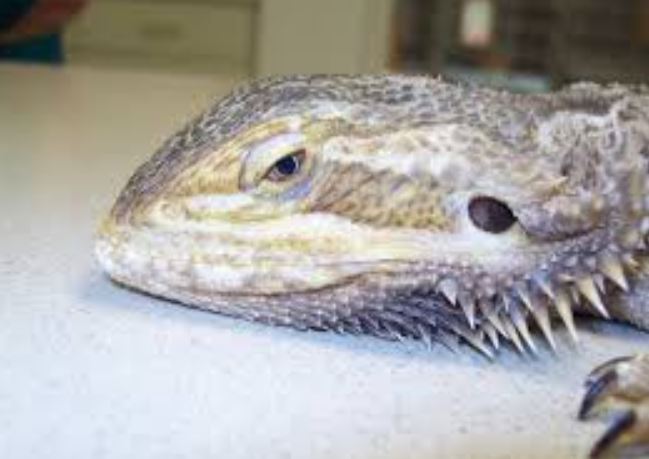
Sunken eyes may be an indication of dehydration in dragons. However, this symptom may also indicate other diseases. That is why it is important for you to consult the vet.
3. Darkness in Urates
It is common for urates that come out with your beardie’s defecation to be white.
In case, your dragon is hydrated, the urates will be orange or yellow.
Frequently Asked Questions About Bearded Dragon Drinking Water
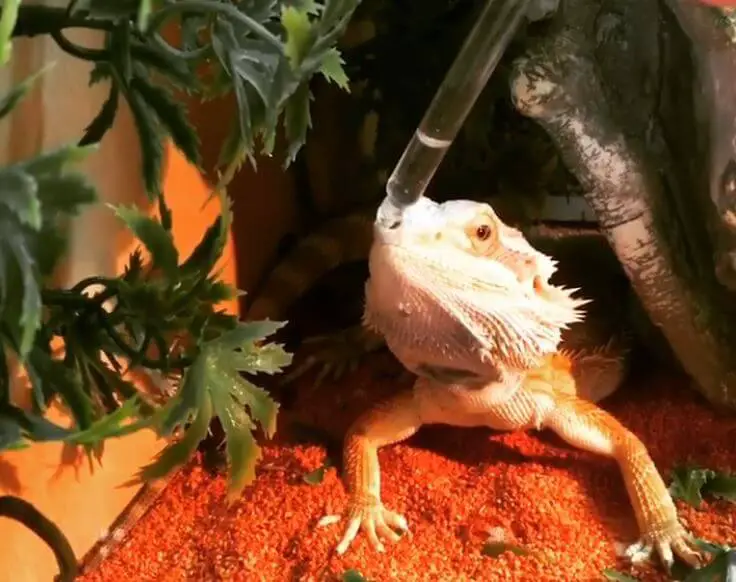
1. How Long Can a Bearded Dragon Go Without Eating?
If it has not been for food, a beardie can survive for different lengths of time, depending on his age, size, and the reason.
Most fully grown and healthy dragons can go for up to 2 months.
2. Do Bearded Dragons Absorb Water Through the Skin?
Yes, absorbing H2O through the skin is one of the natural ways that a lizard use to get hydrated.
That is also the reason why you often see your dragon lay in his dish.
You had better give him a bath at least once a week to help keep him healthy and happy as bathing allows beardies to absorb moisture through their skin.
In specific, you just let your lizard sit, play, and absorb it for a while (up to 15 minutes is highly recommended).
3. Can Bearded Dragons Swim?
Beardies are good at swimming, and they can swim in deep water without any problems.
Read More:
4. Should I Mist Bearded Dragons?
Using misters on lizards not only is effective for providing them with water, but also for making the shedding process go more smoothly.
If you mist your beardie’s skin during shedding, you increase the moisture in the environment — and on his skin — and therefore facilitate the loss of the old skin.
5. Can a Bearded Dragon Have Too Much Water?
As beardies get used to being dehydrated, the fact that your pet drinks too much is not good. Also, You should not feed many watery greens to avoid diarrhea.
Conclusion
After reading this article, we are sure that your question on how long can a bearded dragon go without water is well answered. We hope that you will find it helpful to keep your beardie healthy and hydrated. If you notice some signs of dehydration in your per, you should consult the reptile vet immediately to prevent the condition from worsening.
Key points for how long can bearded dragons go without water:
Bearded dragons, like other reptiles, require water for hydration and bodily functions. Here’s a concise breakdown in bullet points for quick reference:
1. Water Requirement:
- Hydration Needs: Bearded dragons need water for hydration, just like any living creature. They may drink from a water bowl, lick moisture off vegetation, or absorb water through bathing.
- Daily Access: Providing fresh water daily is crucial, even if your dragon gets hydration from other sources like fresh vegetables or occasional misting.
2. Water Retention Ability:
- Water Conservation: Bearded dragons possess efficient water retention abilities. They can conserve moisture by adjusting their behaviors, like reducing urination or seeking moisture from their food.
- Survival Mechanism: In the wild, they adapt to arid conditions by reducing water loss, allowing them to survive in dry environments.
3. Duration Without Water:
- Short-Term Survival: Bearded dragons can survive for several days to a week without direct access to water if they receive hydration from food sources, like juicy vegetables or fruits.
- Dehydration Effects: Prolonged lack of water can lead to dehydration, causing symptoms like lethargy, sunken eyes, wrinkled skin, and eventually organ failure if left untreated.
4. Environmental Factors:
- Humidity Levels: Higher humidity levels or offering baths can supplement their water intake, potentially extending the time they can go without direct drinking.
- Health Conditions: Sick, stressed, or gravid (pregnant) bearded dragons might have increased water needs, reducing the time they can go without water.
5. Monitoring and Hydration Tips:
- Observation: Regularly monitor your dragon’s behavior and hydration levels. Ensure they have access to fresh water and offer baths to encourage drinking if needed.
- Hydration Methods: Mist their enclosure, offer a shallow water bowl, or provide watery fruits and vegetables like cucumber or zucchini to supplement their water intake.
6. Importance of Timely Access:
- Preventive Measures: While bearded dragons have adaptations to conserve water, regular access to clean water is essential for their health and well-being.
- Immediate Intervention: If you notice signs of dehydration or suspect your dragon isn’t drinking, seek veterinary advice promptly to prevent health complications.
In conclusion, while bearded dragons can survive a few days without direct access to water due to their adaptive mechanisms, providing consistent access to fresh water is crucial for their overall health and hydration needs. Regular monitoring and appropriate hydration methods are key to ensuring their well-being.
Further Reading:
- Carolina Custom Cages Terrarium Review
- 8 Best Basking Rocks for Beardie: What Is the Best Choice?
- 10 Best Thermometers for Beardie: How to Choose the Best One?
- 5 Best Beardie Lighting Setups for Beardie Lovers
- 9 Best Heat Lamps for Beardie: Natural Habitat Provided

